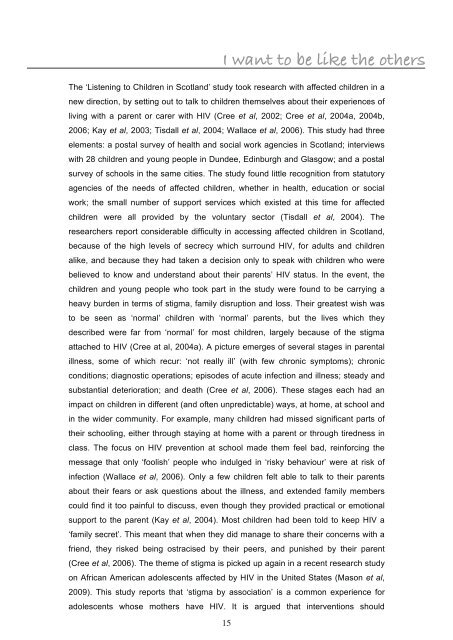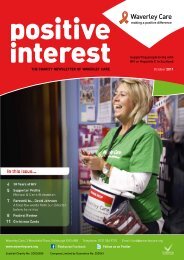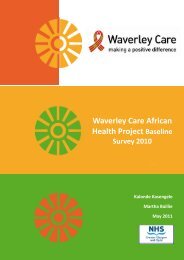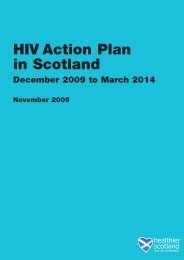I want to be like the others - Waverley Care
I want to be like the others - Waverley Care
I want to be like the others - Waverley Care
- No tags were found...
Create successful ePaper yourself
Turn your PDF publications into a flip-book with our unique Google optimized e-Paper software.
I <strong>want</strong> <strong>to</strong> <strong>be</strong> <strong>like</strong> <strong>the</strong> o<strong>the</strong>rsThe ‘Listening <strong>to</strong> Children in Scotland’ study <strong>to</strong>ok research with affected children in anew direction, by setting out <strong>to</strong> talk <strong>to</strong> children <strong>the</strong>mselves about <strong>the</strong>ir experiences ofliving with a parent or carer with HIV (Cree et al, 2002; Cree et al, 2004a, 2004b,2006; Kay et al, 2003; Tisdall et al, 2004; Wallace et al, 2006). This study had threeelements: a postal survey of health and social work agencies in Scotland; interviewswith 28 children and young people in Dundee, Edinburgh and Glasgow; and a postalsurvey of schools in <strong>the</strong> same cities. The study found little recognition from statu<strong>to</strong>ryagencies of <strong>the</strong> needs of affected children, whe<strong>the</strong>r in health, education or socialwork; <strong>the</strong> small num<strong>be</strong>r of support services which existed at this time for affectedchildren were all provided by <strong>the</strong> voluntary sec<strong>to</strong>r (Tisdall et al, 2004). Theresearchers report considerable difficulty in accessing affected children in Scotland,<strong>be</strong>cause of <strong>the</strong> high levels of secrecy which surround HIV, for adults and childrena<strong>like</strong>, and <strong>be</strong>cause <strong>the</strong>y had taken a decision only <strong>to</strong> speak with children who were<strong>be</strong>lieved <strong>to</strong> know and understand about <strong>the</strong>ir parents’ HIV status. In <strong>the</strong> event, <strong>the</strong>children and young people who <strong>to</strong>ok part in <strong>the</strong> study were found <strong>to</strong> <strong>be</strong> carrying aheavy burden in terms of stigma, family disruption and loss. Their greatest wish was<strong>to</strong> <strong>be</strong> seen as ‘normal’ children with ‘normal’ parents, but <strong>the</strong> lives which <strong>the</strong>ydescri<strong>be</strong>d were far from ‘normal’ for most children, largely <strong>be</strong>cause of <strong>the</strong> stigmaattached <strong>to</strong> HIV (Cree at al, 2004a). A picture emerges of several stages in parentalillness, some of which recur: ‘not really ill’ (with few chronic symp<strong>to</strong>ms); chronicconditions; diagnostic operations; episodes of acute infection and illness; steady andsubstantial deterioration; and death (Cree et al, 2006). These stages each had animpact on children in different (and often unpredictable) ways, at home, at school andin <strong>the</strong> wider community. For example, many children had missed significant parts of<strong>the</strong>ir schooling, ei<strong>the</strong>r through staying at home with a parent or through tiredness inclass. The focus on HIV prevention at school made <strong>the</strong>m feel bad, reinforcing <strong>the</strong>message that only ‘foolish’ people who indulged in ‘risky <strong>be</strong>haviour’ were at risk ofinfection (Wallace et al, 2006). Only a few children felt able <strong>to</strong> talk <strong>to</strong> <strong>the</strong>ir parentsabout <strong>the</strong>ir fears or ask questions about <strong>the</strong> illness, and extended family mem<strong>be</strong>rscould find it <strong>to</strong>o painful <strong>to</strong> discuss, even though <strong>the</strong>y provided practical or emotionalsupport <strong>to</strong> <strong>the</strong> parent (Kay et al, 2004). Most children had <strong>be</strong>en <strong>to</strong>ld <strong>to</strong> keep HIV a‘family secret’. This meant that when <strong>the</strong>y did manage <strong>to</strong> share <strong>the</strong>ir concerns with afriend, <strong>the</strong>y risked <strong>be</strong>ing ostracised by <strong>the</strong>ir peers, and punished by <strong>the</strong>ir parent(Cree et al, 2006). The <strong>the</strong>me of stigma is picked up again in a recent research studyon African American adolescents affected by HIV in <strong>the</strong> United States (Mason et al,2009). This study reports that ‘stigma by association’ is a common experience foradolescents whose mo<strong>the</strong>rs have HIV. It is argued that interventions should1515











